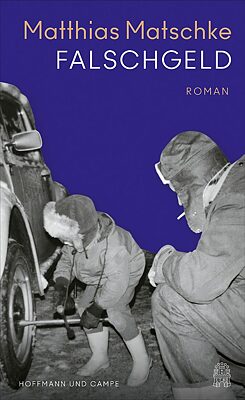Cherrypicker
A Small-Town Youth
Matthias Matschke’s debut novel is ostensibly about growing up in a small West German town in the 1980s. But much more so, it tells the more universal story of what it’s like to search for one’s own place in the world.
By Hendrik Nolde
In a German figure of speech, “feeling like counterfeit money” means feeling disoriented and out of place. This is the feeling that plagues the protagonist of Matthias Matschke’s debut novel Falschgeld, long before he comes into contact with a counterfeit thousand-mark note. Whether in the pew of the village church where his father preaches or in the wealthy circles of his first girlfriend – he doesn’t seem able to fit in completely anywhere.
The name of the first-person narrator is the same as that of the author. The statement “I am Matthias Matschke” repeats itself throughout the novel like a mantra, thus suggesting an autobiographical background. And there are certainly overlaps between the life stories of the literary figure and his creator. Both grow up near Darmstadt in the rural area of southern Hesse and spend their youth in the 1980s. Much more intriguing, however, is why the character almost obsessively insists on repeating his name. It functions as self-assurance, as a routine that provides support while the world, in both large and small ways, seems to be inexorably changing and control over his own life threatens to slip away.
There is no longer an outside
In the (fictional) Matschke family, identity conflicts are by no means just a question of growing up, but a cross-generational phenomenon. Matthias’s father lost two of his first names in the course of fleeing. Somewhere between Silesia and the Odenwald, he changed from a Catholic altar boy to a Protestant pastor. His uncle’s open homosexuality breaks the mould of the otherwise strictly standardised lifestyles of his cohort and he escapes into an artist’s life. His mental illness can initially be dismissed as a “headache,” but after his suicide, the façade of an ideal country life threatens to crumble.With subtle ease, Falschgeld describes the incongruities of middle-class West Germany shortly before the fall of the wall from a youthful perspective without ridiculing them. Matthias’s mother makes a living at the telecommunications office in Dieburg, but “has decided to oppose computers” because with them the outside world threatens to invade her cosy home. But the fact that her son regularly plays a proxy war between the USA and the Soviet Union in the video game Summer Games at a friend’s Commodore 64 reveals that world history has long since arrived in the village.
Gradually, the supposed separation of inside and outside, world events and privacy, which Matthias’s parents frantically try to maintain, breaks down. In the spirit of the classic Bildungsroman, his coming of age is also a process of socio-political socialisation. It is no coincidence that Matthias’s emancipation from the confining parental home coincides with the fall of the wall and the associated promise of pan-German freedom.
When in doubt, embrace it
Matthias Matschke’s debut novel is a linguistically sensitive coming-of-age story that skilfully avoids the pitfalls of this often cliché-laden genre. The conflicts with which his adolescent anti-hero is confronted are told in a personal and incisive way, but without losing their universality. The author takes his protagonist’s teenage struggle for his own place in the world seriously without exposing him as a naïve adolescent. Above all, however, the novel leaves many of its lines of conflict undecided and does not aim for forced reconciliation.Enduring contradictions is perhaps the most important lesson Matthias takes away from his dysfunctional parental home. The parents, for whom nothing was more important than the integrity of privacy in their home, hardly had anything nice to say to each other behind its closed doors. In contrast, the family spent their best hours on the visitors’ terrace of Frankfurt Airport. On Sunday excursions, they sit there in silence in the middle of this maximally public place, watch the planes and “each of us dreams of where they’re flying to and coming from.” With so much acquired inner inconsistency, it seems logical when Matthias eventually moves to Berlin to become – like the author himself – an actor. Only a few months before, despite all his self-doubt, he had finally been convinced of one thing: “I don’t know yet what I ever want to be, but that’s the way I see the least, as an actor.”
Matthias Matschke: Falschgeld. Roman.
Hamburg: Hoffmann und Campe, 2022. 256 pp.
ISBN: 978-3-455-01463-1
You can find this title in our eLibrary Onleihe.

